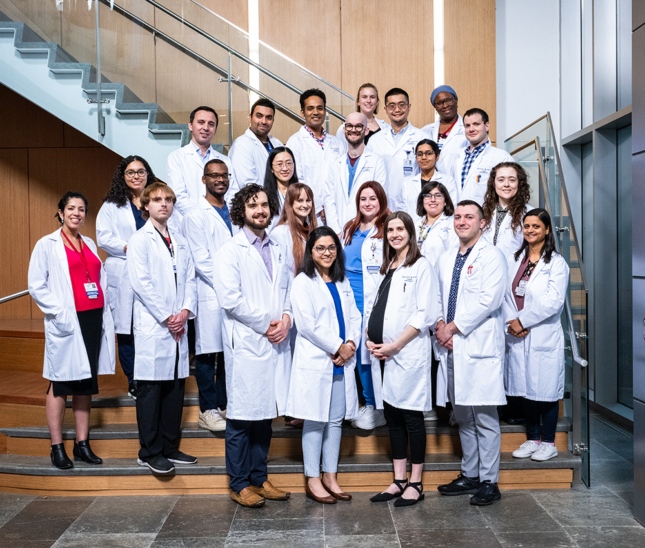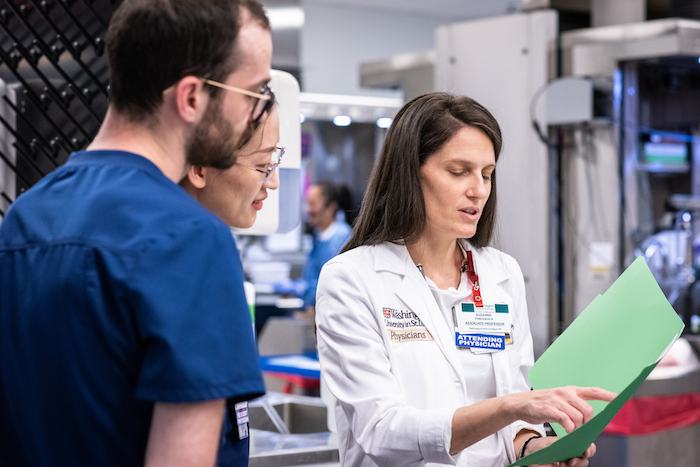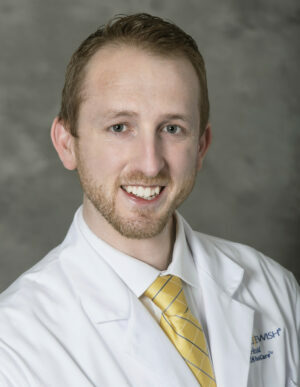
Welcome to the Washington University School of Medicine Department of Pathology & Immunology. One pillar of our department’s tri-part mission is to provide exceptional training to the next generation of pathology and immunology professionals.
From anatomic pathology to clinical pathology to combined anatomic and clinical pathology and more, our residency programs span many areas of pathology, with options to suit all interests. Although initial training is highly supervised, we emphasize acquiring skills that will allow residents to function as confident, independent and highly-effective members of a health care team.

Our Programs
Learn more about our training programs:
Requirements for US graduates
- ERAS application
- Dean’s Letter
- Medical school transcript
- Personal statement
- Official copy of your USMLE or COMLEX scores
- Three (3) letters of recommendation with at least one from current medical school faculty
Requirements for foreign medical graduates
- ERAS application
- Valid ECFMG Certification by the first day of the residency program
- Medical school transcript
- Personal statement
- Three (3) letters of recommendation (at least one from the US)
- J-1 visa
GME consortium requirement for pre-employment screening
The Joint Commission on Accreditation of Healthcare Organization (JCAHO) has clarified HR Standard 1.20 to provide that hospitals are now required to screen trainees in the same manner as staff employed by the hospital if the trainees work in the same capacity as staff who provide care, treatment and services. In order to meet this standard and continue to provide safe, quality patient care and excellent educational opportunities, the GME Consortium has implemented additional screening requirements for trainees. These additional requirements are consistent with the requirements imposed on other employed staff.
House staff paid by Barnes-Jewish Hospital, St. Louis Children’s Hospital and Washington University School of Medicine are required to successfully pass all screening requirements including a drug test and criminal background check prior to beginning their training at this institution. All Consortium policies and procedures governing house staff are available on the GME website.
For additional information please contact:
Sharon Aubuschon
Senior Residency Program Coordinator
314-747-0687
a.sharon@wustl.edu
Samuel Ballentine, MD
Program Director
314-273-8308
samuel.ballentine@wustl.edu
Katherine Schwetye, MD, PhD
Co-Associate Residency Program Director
314-273-4873
schwetyk@wustl.edu
Suzanne Thibodeaux, MD, PhD
Co-Associate Residency Program Director
314-273-1465
srthibodeaux@wustl.edu
Department of Pathology & Immunology
Washington University School of Medicine
660 S. Euclid Ave., Box 8118
St. Louis, MO 63110
The salary schedule and benefits available to our residents are very competitive, especially considering the relatively low cost of living in St. Louis. The information below is current for Barnes-Jewish Hospital/Washington University School Of Medicine, Department of Pathology and Immunology.
Post-graduate salaries (2024-2025 academic year)
| PGY-1 | PGY-2 | PGY-3 | PGY-4 | PGY-5 |
| $67,808 | $70,816 | $73,679 | $76,999 | $80,372 |
Benefits
Please refer to the Graduate Medical Education information.
Department of Pathology & Immunology resident benefits
- Up to $1,000 for educational resources — excluding electronic devices
- Financial reimbursement to conferences for first author presenters
- While moonlighting is not permitted for trainees, a specific opportunity for compensated professional services is offered to qualified senior trainees through Washington University’s partnership with a local organ procurement organization
- Noon seminars that frequently provide lunch
- Access to the medical school’s eight-level library
- Available desk/workspace for each resident, including desktop computer and microscope (for AP residents) in one of two residents’ rooms
- Access to free on-site parking with shuttle service
- Discounts of 30% in Barnes-Jewish Hospital cafeterias
- Discounts in the Barnes-Jewish Hospital pharmacy when enrolled with one of the medical plans
- Access to Washington University Core Facilities for research
- Intradepartmental funds available for anatomic pathology research projects, up to $20,000
One of the department’s longstanding traditions is to provide core clinical and research training for individuals planning a career in academic pathology. However, our programs are also well-suited to individuals who plan to pursue careers in hospital- or community-based medical practice.
The goals and aims of the residency program are to:
- Ensure that residents become proficient in core clinical competencies and evidence- and practice-based medicine, while also acquiring essential interpersonal and communication skills
- Train clinically-oriented residents in modern methods of clinical investigation to advance knowledge applied to anatomic pathology and laboratory medicine
- Provide opportunities to participate in sophisticated biomedical research that advances knowledge of the molecular pathogenesis of human disease
Trainees in this department benefit from:
- A high volume of complex as well as “bread and butter” cases
- 55,000 surgical specimens per year
- World-renowned faculty include Louis P. Dehner, MD, a highly gifted general surgical and pediatric pathologist; and Jeffrey I. Gordon, MD, often dubbed “the father of the microbiome”
- Numerous experts in their fields, covering several subspecialties, who are eager to teach residents at the microscope and in informal didactic sessions
- Abundant clinical, translational and basic science research opportunities
- 5 full-time pathologist assistants and one pathology assistant trainee
- Clinical pathology with resident responsibilities essential to clinical care
- Sign-out of multiple, high-volume next-generation sequencing assays within our in CAP-certified, CLIA-licensed molecular laboratories.
- Exposure to lab management, including a dedicated “Pathology Management” lecture series and participation in biennial mock-CAP inspections.
- A dedicated desk within the resident room, assigned yearly, which is equipped with a microscope, computer, telephone and filing cabinet.
- An extensive anatomic pathology (AP) and clinical pathology (CP) trainee library within the Residents Room, replenished yearly using a dedicated departmental fund
AP and AP/CP trainees benefit from:
- Sub-specialty sign-out with many internationally renowned surgical pathologists who are eager to teach residents at the microscope and through formal didactic sessions.
- 5 full-time pathologists assistants and one pathology assistant trainee
- A Digital Imaging Center, which scans and stores slides for teaching conferences, personal study sets and research
CP and AP/CP trainees benefit from:
- Direct interaction with clinical providers and laboratory staff to provide consultative, interpretative and test utilization services
- Routine high-complexity test sign-out as a part of hematology, clinical chemistry, clinical microbiology and molecular rotations
- Experience in high-throughput testing and total laboratory automation within the clinical chemistry and clinical microbiology laboratories
- Primary management of a robust in-patient apheresis consult service
- Hands-on training in clinical informatics, machine learning and quality improvement as part of a dedicated, longitudinal pathology informatics course
Mentoring opportunities
Anatomic pathology and laboratory medicine residents work closely with department faculty in one-on-one interactions involving interpretation and diagnosis of autopsies and surgical specimens and in clinical laboratory diagnosis. All residents are encouraged to seek the ongoing counsel of their faculty advisors in selecting curricular options, in designing elective activities and in career planning. Residents also are strongly encouraged and provided ample opportunities to undertake in-depth investigative activities with any individual faculty mentors. Residents who aspire to academic careers in basic scientific investigation will develop long-term mentoring relationships with Washington University scientists in whose laboratories they undertake postdoctoral research training.
Resident input
The Department of Pathology & Immunology values the continuous input of residents in constantly refining and improving our residency program. Residents are strongly encouraged to discuss any academic or personal issues with their advisors or the department faculty member whom they feel would be most appropriate. Specific issues should be discussed first with their advisors and then the chief resident in anatomic pathology or laboratory medicine who can usually help in reaching a resolution. If a matter requires further consideration, residents or their advisors should consult the chief of service (surgical pathology, autopsy pathology or laboratory medicine) and, if necessary, the department chair. Residents also give input about the program and the faculty at an annual program/faculty review.
Sharon Aubuschon
Senior Residency Program Coordinator
314-747-0687
a.sharon@wustl.edu
Samuel Ballentine, MD
Program Director
314-273-8308
samuel.ballentine@wustl.edu
Katherine Schwetye, MD, PhD
Co-Associate Residency Program Director
314-273-4873
schwetyk@wustl.edu
Suzanne Thibodeaux, MD, PhD
Co-Associate Residency Program Director
314-273-1465
srthibodeaux@wustl.edu
Department of Pathology & Immunology
Washington University School of Medicine
660 S. Euclid Ave., Box 8118
St. Louis, MO 63110
314-362-1307
nwanderson@wustl.edu
Testimonial
 “I chose Washington University in St. Louis for my pathology residency because of the exceptional faculty, the breadth of research opportunities, the outstanding clinical training, and the diverse group of residents and fellows who I now gladly call friends. At every turn, I have been impressed by the depth of knowledge and experience among both faculty and trainees. Although many of the faculty are leaders in their fields, they do not hold this as a point of pride but rather as an opportunity and even a mandate to pass on this knowledge to others. I feel fortunate to be part of the WashU tradition and benefit from so many great teachers and mentors. All said I couldn’t be happier with my experience in St. Louis and my time at WashU!”
“I chose Washington University in St. Louis for my pathology residency because of the exceptional faculty, the breadth of research opportunities, the outstanding clinical training, and the diverse group of residents and fellows who I now gladly call friends. At every turn, I have been impressed by the depth of knowledge and experience among both faculty and trainees. Although many of the faculty are leaders in their fields, they do not hold this as a point of pride but rather as an opportunity and even a mandate to pass on this knowledge to others. I feel fortunate to be part of the WashU tradition and benefit from so many great teachers and mentors. All said I couldn’t be happier with my experience in St. Louis and my time at WashU!”
– Daniel Webber, Former Fellow, Molecular Genetic Pathology
Office of Education Committees
A listing of standing committee meetings throughout all training programs:
Education Leadership Steering Committee (ELSC)
- Organizers: Vice Chair Office of Education and Assistant to Vice Chair
- Meetings: at least annual or as needed
- Attendees: ELSC Committee members and invited advisors
Trainee Program Leadership (TPL)
- Program: Residency and Fellowships
- Organizer: Chief-Resident
- Frequency: Weekly at 4:00 PM on Tuesdays
- Attendees: Program Directors, Chief residents, Program Administrators, Director of Clinical Operations and Administration
- Purpose: Focuses on daily issues and the administrative needs within the training programs
Trainee Leadership Committee (TLC)
- Program: Residency and Fellowships
- Organizer: Chief Resident
- Frequency: Quarterly
- Attendees: Trainees nominated to TLC, Chief Residents and Program Directors
- Purpose: Focuses globally on the training programs
Program Evaluation Committee (PECs)
- Program: Each ACGME accredited Residency or Fellowship Program has a separate committee meeting. The fellowships include: NP, LGM Blood Banking and Transfusion Medicine, and all AMP fellowship programs except Liver/GI
- Organizer: Program Administrators
- Frequency: Yearly (May and June)
- Attendees: Relevant Program Directors, Administrators, Program Trainees and other faculty
Clinical Competency Committee (CCCs)
- Program: Each ACGME accredited Residency or Fellowship Program has a separate committee meeting. The fellowships include: NP, LGM Blood Banking and Transfusion Medicine, and all AMP fellowship programs except Liver/GI.
- Organizer: Program Administrators
- Frequency: Twice a year (December/May or June)
- Attendees: Program Directors, Program Administrators, and faculty
Trainee meeting with Dr. Cote
- Program: Residency and Fellowship
- Organizer: Department Chief Administrative Assistant
- Frequency: Quarterly
- Attendees: All trainees
Vice Chair Meeting with Dr. Cote
- Office of Education
- Organizer: Vice Chair of Office of Education and Department Chief Administrative Assistant
- Frequency: bimonthly
- Attendees: Department Chair and Vice Chair of Education
ELSC Subcommittee for Medical Education
- Frequency: Monthly
- Attendees: Vice Chair of Education with Subcommittee Members
ELSC Subcommittee for Residency Training
- Frequency: Monthly
- Attendees: Vice Chair of Education with Neil Anderson, Residency Program Director
ELSC Subcommittee for Clinical Fellowship Training
Frequency: Monthly
Attendees: Vice Chair with Ian Hagemann, Subcommittee Chair
Division of Physician-Scientists
Supporting career development of physician-scientists by providing a blend of resources, mentorship and programs at all career stages.
Skill Development for Educators
- Giving and Receiving Feedback
Presented by Sarah Bean, MD, Duke University School of Medicine, Pathology
Grand Rounds recording presented October 29, 2020
- Hear more about what our residents have to say about WashU.
- View a list of our graduates.
- Read a letter from our program directors.